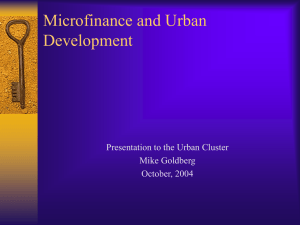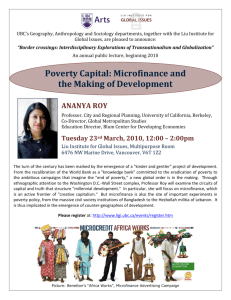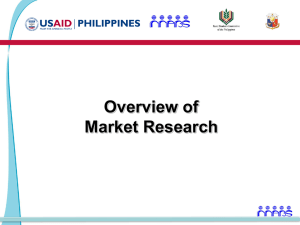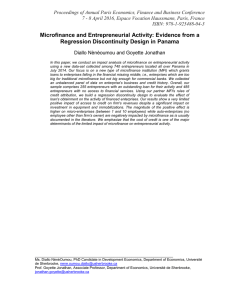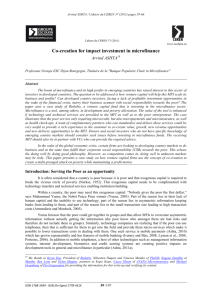Ms. Ann J. Miles
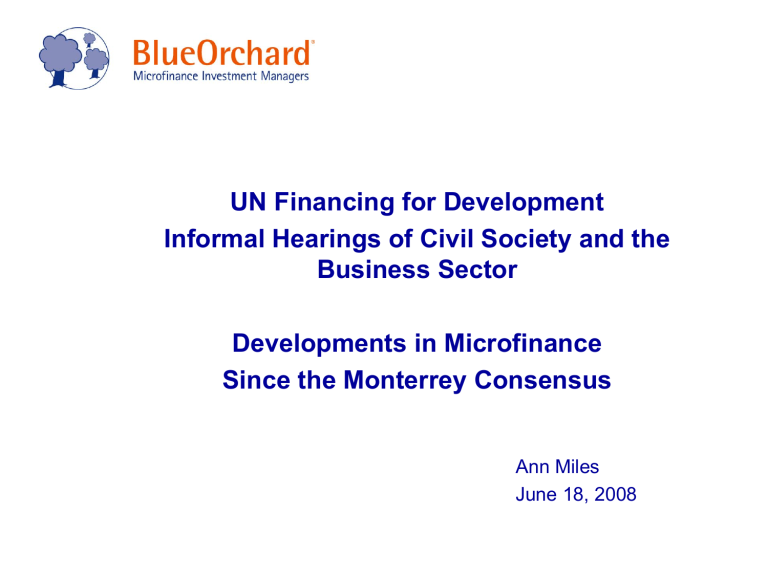
UN Financing for Development
Informal Hearings of Civil Society and the
Business Sector
Developments in Microfinance
Since the Monterrey Consensus
Ann Miles
June 18, 2008
The current landscape of microfinance
80 million clients served in 2007 compared to 22 million clients served in 2002, average annual growth rate of 30%.
231 Sustainable Microfinance Institutions in 2007.
Funding has grown to $17 billion at end of 2006; $13 billion was domestic and $4 billion was international.
Microfinance is moving beyond providing credit only services to broader financial services for the poor.
2
Developments in Local Markets
Microfinance institutions have increasingly offered savings services to their clients.
Local banks have extended financing to microfinance institutions.
Microfinance institutions have become regulated financial institutions and now issue local bonds and other securities. Recently, securitizations of loan portfolios were done in India and Bangladesh.
Local banks and other local corporations have started to deliver financial services to microentrepreneurs.
3
Developments in International Markets
There is significant growth in the number of investment funds providing both debt and equity to microfinance institutions.
Several global banks have organized business departments to work with microfinance institutions (for example, Citigroup, JPMorganChase and ING).
International financings are now routine where funds are raised from international investors and placed with local microfinance institutions.
Other financial services are being considered including the provision of microinsurance and housing loans.
4
How have private sector resources been mobilized for development?
Grameen Telecom successfully delivers mobile phone banking services to its clients. The replication manual was published by UN
Information and Communication Task force for adoption in Senegal and other countries.
Safaricom, owned by the Kenyan government, Vodaphone and other shareholders, offers M-PESA, a mobile-phone based stored value account for low income clients
The IFC invested in credit linked notes issued by Standard Chartered
Bank to facilitate microfinance in Sub-Sahara Africa and Southeast Asia.
Prudential is providing credit life insurance to microentrepreneurs in
India.
5
How can government and private sector resources promote the growth and expansion of microfinance?
By recommitting to key principles of microfinance developed and endorsed by CGAP (Consultative Group to Assist the Poor) and its members, and further endorsed by the Group of Eight leaders at the GS
Summit on June 10, 2004, specifically among others:
-Interest rate ceilings hurt poor people by making it harder for them to get credit.
-The role of government is to enable financial services, not to provide them directly.
-Donor funds should complement private capital, not compete with it.
6
What will happen in the next five years?
The strongest microfinance institutions will build broader and more diverse financial services for their clients; they will also consider expanding geographically and even beyond their own countries
These same institutions will consider listing on local and international stock exchanges to finance growth
Microfinance institutions will explore collaborations and joint ventures in order to leverage their platforms to address larger development issues, i.e. clean water, energy, environment and education
7
